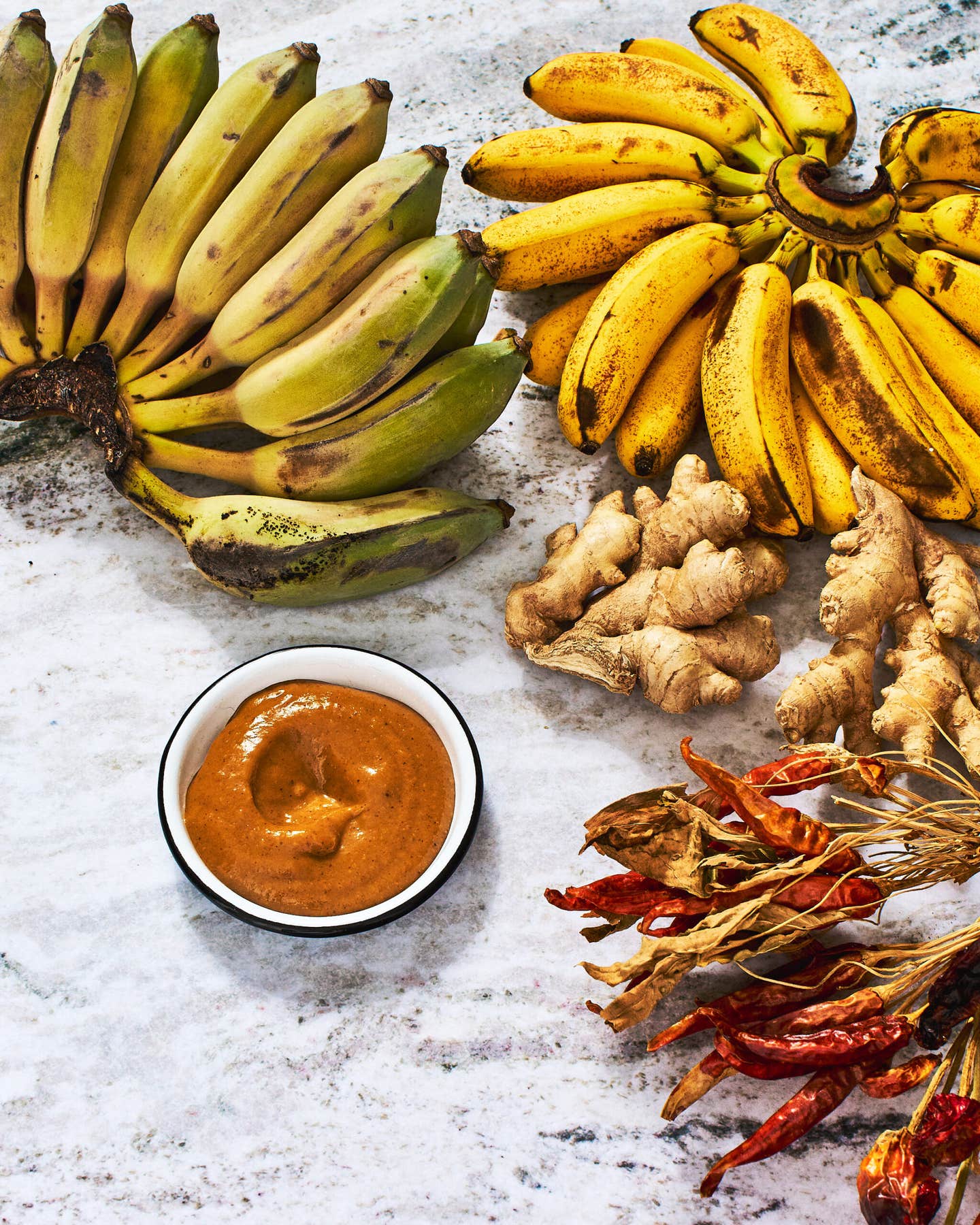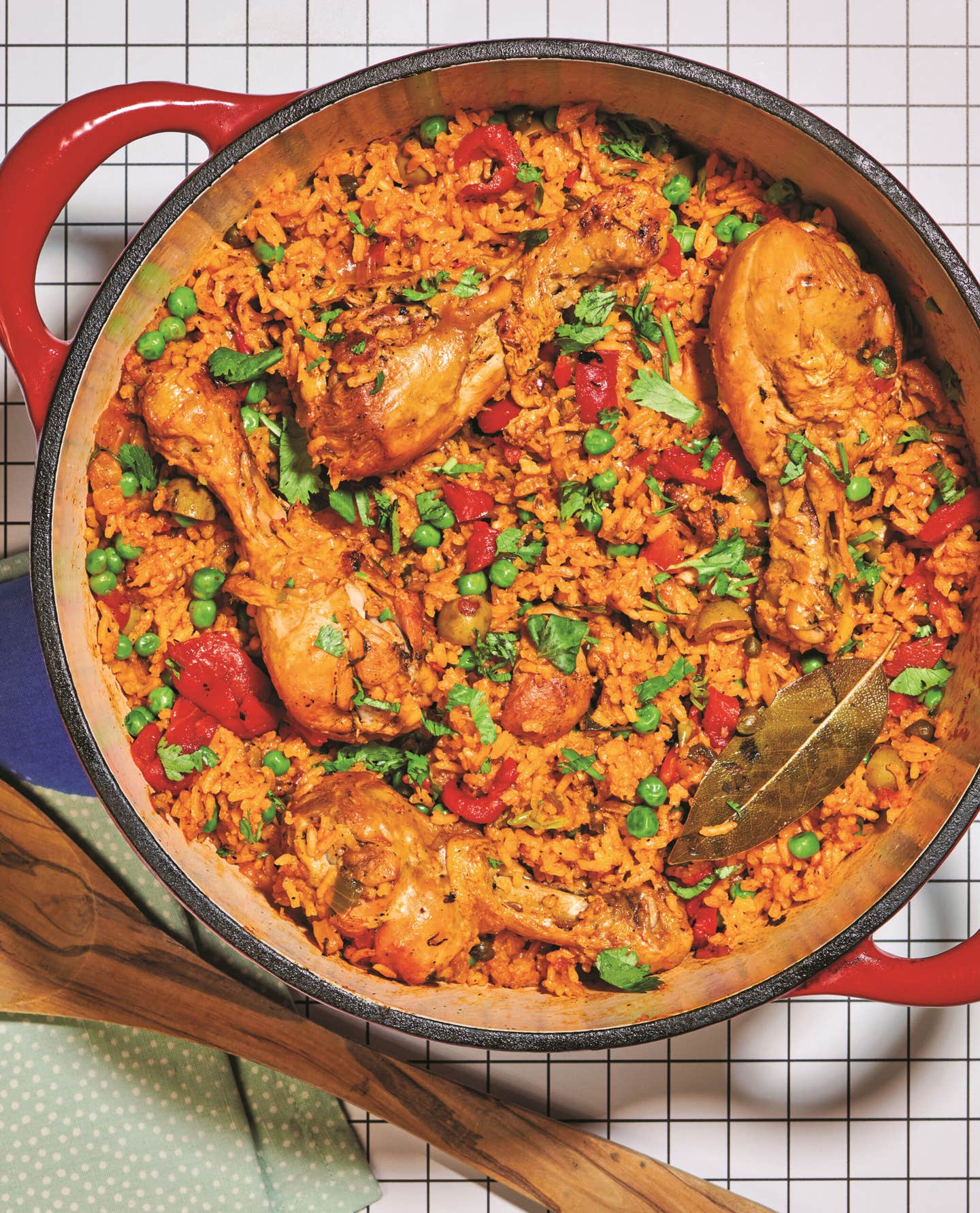
30 Recipes to Cook With Soy Sauce
The humble condiment of fermented soybeans transcends cultures in marinades, dips, sauces, and more
Soy sauce is a wonderfully versatile ingredient that can stand in as a funkier, more flavorful salt in many situations. In many Asian cuisines, it's essential. Try marinating your grilled meats with the stuff, or diluting it into a salad dressing or dipping sauce. From Korean fried chicken to stir-fried breakfast noodles, here are the best ways to cook with soy sauce.
Coffee-and Soy-Marinated Flank Steak
Strong coffee pairs with soy sauce and lightly caramelized garlic and onions in a marinade that leads to ultra-juicy flank steak. Get the recipe for Coffee-and Soy-Marinated Flank Steak »
Strong coffee pairs with soy sauce and lightly caramelized garlic and onions in a marinade that leads to ultra-juicy flank steak. Get the recipe for Coffee and Soy-Marinated Flank Steak »
Soy-and-Honey-Glazed Fluke Steaks
Chef Chris Fischer fell in love with the simple, robust marinades common to many Japanese dishes after traveling to Japan for work. Here he marinates fluke steaks—have your butcher cut them for you, or substitute flounder or sea bass steaks—in a sticky mixture of soy sauce, mirin, and honey. Get the recipe for Soy-and-Honey-Glazed Fluke Steaks »
Chef Chris Fischer fell in love with the simple, robust marinades common to many Japanese dishes after traveling to Japan for work. Here he marinates fluke steaks—have your butcher cut them for you, or substitute flounder or sea bass steaks—in a sticky mixture of soy sauce, mirin, and honey. Get the recipe for Soy-and-Honey-Glazed Fluke Steaks »
Chiles, scallions, garlic, ginger, and soy sauce flavor tender chicken and peanuts in this moderately spicy dish. Get the recipe for Kung Pao Chicken »
Kkaennip-jangajji, or soy-sauce-fermented perilla leaves, are a popular banchan, or side dish, served in Korean cuisine. The fresh leaves (sometimes referred to as sesame leaves, though unrelated) are similar to shiso but slightly sturdier, so they hold up well to pickling in the salty marinade. This dish is typically served with rice; lay one leaf over a bowl of rice, then use your chopsticks to pinch the leaf downward, wrapping it around a scoop of rice, before eating. Get the recipe for Marinated Perilla Leaves (Kkaennip-Jangajji) »
Korean Fried Chicken
Double-frying chicken wings is the secret in Korean recipes to achieving the delicate, crackly crust that is the hallmark of this popular Korean specialty, made famous in this country at the Los Angeles restaurant Kyochon. Cathy Danh wrote about this snack in “The Other KFC” for our March 2010 issue. Get the recipe for Korean Fried Chicken »
Double-frying chicken wings is the secret to achieving the delicate, crackly crust that is the hallmark of this popular Korean specialty, made famous in this country at the Los Angeles restaurant Kyochon. Cathy Danh wrote about this snack in "The Other KFC" for our March 2010 issue. Get the recipe for Korean Fried Chicken »
Korean Cold Buckwheat Noodles (Jaengban Guksu)
Don’t be fooled by the vegetable-heavy spread; this dish is sure to fill you up. A medley of thinly sliced vegetables is piled up with a mound of cold buckwheat noodles. They’re dressed with a slurpable spicy and savory gochujang sauce that makes for a Korean take on a chef’s salad. Get the recipe for Korean Cold Buckwheat Noodles (Jaengban Guksu) »
Don't be fooled by the vegetable-heavy spread; this dish is sure to fill you up. A medley of thinly sliced vegetables is piled up with a mound of cold buckwheat noodles. They're dressed with a slurpable spicy and savory gochujang sauce that makes for a Korean take on a chef's salad. Get the recipe for Korean Cold Buckwheat Noodles (Jaengban Guksu) »
Brisket is braised in stout, bourbon, and soy sauce in these spicy pimento cheese-topped sliders from Edward Lee, executive chef at 610 Magnolia in Louisville, KY. Get the recipe for Braised Brisket Burgers with Pimento Cheese »
Stir-Fried Breakfast Noodles
Any Chinese noodle—rice, wheat, flat, thin, or broad—can be used in this simple stir-fry from author Francis Lam; it’s one of his favorite breakfast dishes. Get the recipe for Stir-Fried Breakfast Noodles »
Any Chinese noodle—rice, wheat, flat, thin, or broad—can be used in this simple stir-fry from author Francis Lam; it's one of his favorite breakfast dishes. Get the recipe for Stir-Fried Breakfast Noodles »
Instead of the cookout-classic pasta salad, serve this refreshing Asian noodle dish zipped up with crunchy vegetables. Get the recipe for Soba Salad with Marinated Cucumber and Ponzu »
This refreshing salad of soba noodles tossed with winter greens and mixed vegetables is brought together by a tart dressing of miso, ginger juice, and lemon. Get the recipe for Soba Salad with Lemon-Miso Vinaigrette »
Chef Josita Hartanto of Berlin's Lucky Leek mixes three marinated seaweeds with sweet caramelized mushrooms, steamed vinegary rice, and crisp toasted nori in this vegan rice bowl. All of the seaweeds used here can be found online so search them out, as they each contribute a different texture and taste to this salad. Get the recipe for Seaweed Salad with Orange and Macadamia Nuts »
Full-flavored chicken meatballs smothered in a sweet and salty glaze. Get the recipe for Japanese Grilled Chicken Meatballs (Tsukune) »
These full-flavored chicken meatballs get dressed with a sweet and salty glaze. Get the recipe for Japanese Grilled Chicken Meatballs »
A fragrant mix of oyster sauce, cilantro, and ginger pulls double duty here as both a marinade and dipping sauce for lamb rib chops. Get the recipe for Grilled Lamb Chops with Ginger Sauce »
This recipe calls specifically for gyokuro, a premium Japanese tea that, unlike other green varieties, retains plenty of their flavor after repeated steepings. We recommend the Kanro gyokuro from Ippodo for this salad, which uses the tea leaves left over from one serving of tea and flavors them with soy sauce and sesame oil. Get the recipe for Japanese Tea Leaf Salad »
Seared Scallops with Steamed Brussels Sprout Leaves
Seared Scallops with Steamed Brussels Sprout Leaves
The umami-rich combination of ginger and soy sauce in this scallop dish from Margaux Laroche of Domaine d'Henri is an unusual yet perfect pairing for a glass of crisp chablis. Get the recipe for Seared Scallops with Steamed Brussels Sprout Leaves »
A classic Chinese dish made with boiled-then-stir-fried pork and plenty of leeks and fermented black soy beans. Boiling the pork (the first "cooked") renders some of the fat and makes it easier to slice and crisp up later in a blazing-hot wok. Get the recipe for Sichuan Twice-Cooked Pork Belly »
"Filipinos love anything with adobo sauce, and kangkong is one of my favorite vegetables to eat." – Leah Cohen of Pig & Khao Get the recipe for Philippine Vinegar-Braised Greens (Kangkong Adobo) »
Pork and Cabbage Potstickers
Chinese New Year has come and gone, but that doesn’t mean you can’t keep celebrating with these easy-to-make potstickers. Get the recipe for Pork and Cabbage Potstickers »
Chinese New Year has come and gone, but that doesn't mean you can't keep celebrating with these easy-to-make potstickers. Get the recipe for Pork and Cabbage Potstickers »
Mixed Mushroom Foil Yaki
Mushrooms get cooked in a foil pouch with Asian sauces in this effortless “one-foil” dish. Get the recipe for Mixed Mushroom Foil Yaki »
Mushrooms get cooked in a foil pouch with Asian sauces in this effortless "one-foil" dish. Get the recipe for Mixed Mushroom Foil Yaki »
Deep-Fried Pork Spring Rolls (Lumpia)
Best known in their deep-fried iteration, lumpia often crackle beneath the teeth. But not always; some come wrapped in fresh egg crepes, while others are wrapper-less. Connoisseurs pine for a version made with shrimp, pork, and shredded coconut palm. The freshly fried version is a marvel, the wrapper crisp, the filling’s texture delicate and yielding. Instead of the common sweet-sour dipping sauce, chef Dale Talde opts for the condiment he used growing up—a mixture of vinegar and soy sauce spiked with raw garlic and fiery chiles—which he likens to the salt and pepper of Filipino food. Get the recipe for Deep-Fried Pork Spring Rolls (Lumpia) »
Best known in their deep-fried iteration, lumpia often crackle beneath the teeth. But not always; some come wrapped in fresh egg crepes, while others are wrapper-less. Connoisseurs pine for a version made with shrimp, pork, and shredded coconut palm. The freshly fried version is a marvel, the wrapper crisp, the filling's texture delicate and yielding. Instead of the common sweet-sour dipping sauce, chef Dale Talde opts for the condiment he used growing up—a mixture of vinegar and soy sauce spiked with raw garlic and fiery chiles—which he likens to the salt and pepper of Filipino food. Get the recipe for Deep-Fried Pork Spring Rolls (Lumpia) »
These are chicken wings, Filipino-style, marinated in rice vinegar, soy sauce, bay leaves, and garlic. Serve them with a creamy ginger-enriched dipping sauce and chile-dusted apple slices for a full bar snack. Get the recipe for Adobo Chicken Wings »
This spicy, easy stir-fry is all about the sticky, slightly sweet sauce that coats the chicken and cashews. But, like all good stirfries, this can be catered to your taste—add in whatever mix-ins you have in your fridge or pantry. Get the recipe for Stir-Fried Chicken with Cashew Nuts »
Sichuan Noodles with Spicy Pork Sauce (Dan Dan Mian)
For this beloved dish of China’s Sichuan province, a tangle of wheat noodles is topped with a spicy, pungent pork sauce. This recipe is adapted from one in Fuschia Dunlop’s Land of Plenty (W.W. Norton & Company, 2003). Inspired by an article in SAVEUR No. 154 (March 2013), it first appeared in our Jan/Feb 2014 SAVEUR 100 issue with the article 20 Years of SAVEUR: Capital of Heat. Get the recipe for Sichuan Noodles with Spicy Pork Sauce »
For this beloved dish of China's Sichuan province, a tangle of wheat noodles is topped with a spicy, pungent pork sauce. This recipe is adapted from one in Fuschia Dunlop's Land of Plenty (W.W. Norton & Company, 2003). Inspired by an article in SAVEUR No. 154 (March 2013), it first appeared in our Jan/Feb 2014 SAVEUR 100 issue with the article 20 Years of SAVEUR: Capital of Heat. Get the recipe for Sichuan Noodles with Spicy Pork Sauce »
Grilling then smoking these ribs gives them an intense crust and soulful flavor. Get the recipe for Char-Smoked Baby Back Ribs »
Pineapple and Pork Teriyaki Skewers
Sweet grilled onion and pineapple stand up against rich marinated pork in these easy, Hawaiian-inspired skewers. Get the recipe for Pineapple and Pork Teriyaki Skewers »
Sweet grilled onion and pineapple stand up against rich marinated pork in these easy, Hawaiian-inspired skewers. Get the recipe for Pineapple and Pork Teriyaki Skewers »
Lovely persimmons aren't just for salads and desserts. We also like to cook them in savory dishes, including this crispy pork belly simmered with miso, honey, and sake. Get the recipe for Crispy Pork Belly with Persimmons »
For this dish, we like to use leaner, Chinese-style spareribs, also called St. Louis style, from which the breast bones and flaps of cartilaginous meat have been removed. Get the recipe for Chinese Barbecue Spare Ribs »
Char siu (meaning "fork roast") is typical in Chinese cuisine and normally gets its red hue from food coloring. In this rendition, beet powder, a natural alternative, lends the bright red color and adds a little sweetness. Get the recipe for Char Siu Chicken »
Full of fiery chiles and warm spices, the all-purpose Jamaican seasoning for this dish can be used as a rub on pork, goat, fish, and vegetables, as well as chicken. Get the recipe for Jamaican Jerk Chicken »
Dashi-Braised Chicken with Root Vegetables
Dashi, an enhanced kelp stock with rich umami flavor, is a staple component of Japanese cooking; it has the remarkable effect of accentuating the flavors of anything cooked in it. At the Los Angeles restaurant n/naka, chef Niki Nakayama uses it to braise chicken thighs and root vegetables for a hearty, comforting dish. Get the recipe for Dashi-Braised Chicken with Root Vegetables »
Dashi, an enhanced kelp stock with rich umami flavor, is a staple component of Japanese cooking; it has the remarkable effect of accentuating the flavors of anything cooked in it. Use it to braise chicken thighs and root vegetables for a hearty, comforting dish. Get the recipe for Dashi-Braised Chicken with Root Vegetables »
Keep Reading
Continue to Next Story










